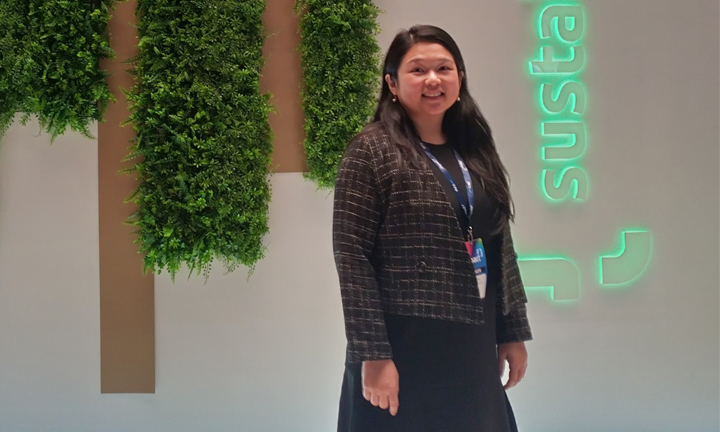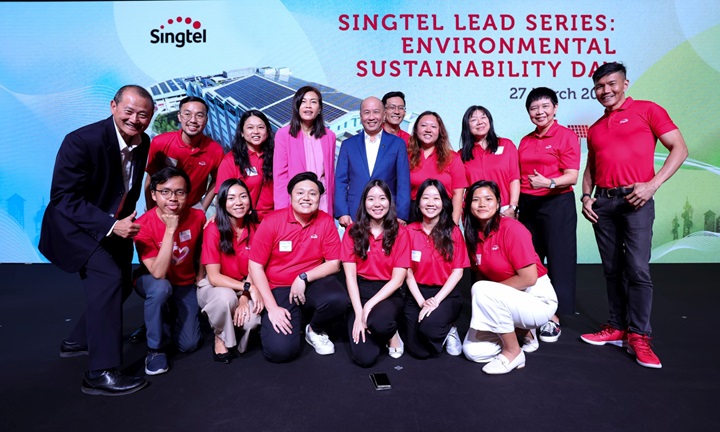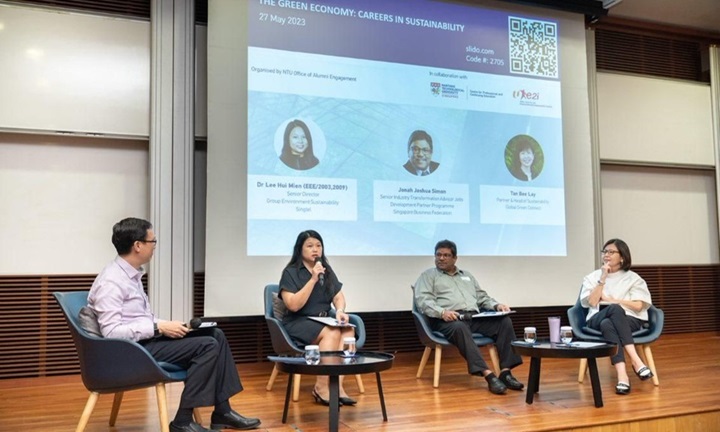Forging her career path in sustainability
In conjunction with Earth Day, we speak to NTU School of Electrical and Electronic Engineering (EEE) alumna Dr Lee Hui Mien, one of Singapore’s pioneers in circular economy with almost two decades of sustainability research and industry experience.
By Nur Isyana Isaman
Sustainability is a buzzword today, but it was almost unheard of in 2003 when Dr Lee Hui Mien (EEE/2003) started her PhD journey at NTU after graduating with a Bachelor of Engineering in Electrical and Electronic Engineering.

While brainstorming her PhD topic, Dr Lee was keen to combine her educational background in engineering and her passion for environmental causes, which she nurtured throughout her growing years, including being the ninth president of Earthlink NTU.
“Electronic gadgets were becoming prevalent then, which eventually led to a lot of e-waste. That was one of the main reasons why, in my PhD from 2003 to 2009, I looked into closed-loop product life cycle management – now known as circular economy – to research a methodology that can help designers develop electronic products with less environmental impact by improving the product end-of-life management,” said Dr Lee.
Leading corporate sustainability
Today, the 43-year-old is one of the local pioneers in her field. Over the past 11 years, she has led corporate sustainability at IKEA Southeast Asia, followed by Singapore’s Mandai Park, and at Singtel, she is the Head of Group Environmental Sustainability.
 Dr Lee Hui Mien (standing, third from left) with her Singtel colleagues during their Environmental Sustainability Day 2024.
Dr Lee Hui Mien (standing, third from left) with her Singtel colleagues during their Environmental Sustainability Day 2024.
“Corporate sustainability comes down to how you do more business with less environmental impact and more societal impact. In every role I am in, I need to quickly understand the industry and its commerciality to work on the best way to move the company towards sustainability,” said Dr Lee.
Describing sustainability as a change management function, Dr Lee says the biggest challenge is rallying support at the start of a new project. To tackle this, she sets out a sustainability vision that is relatable to different groups of stakeholders across the entire organisation.
She explained, “When people start to relate and understand, they will start to change and collaborate with you to test new things. I tell people, I am not here to make you do extra work, but I am asking you to convert a small part, maybe about 20%, of what you currently do into sustainable practices. Sustainability investment is no different from technology investment.”
Another critical challenge is debunking the common misconception that sustainability requires spending more money and thus can only be done by big companies. “The idea that sustainability is a luxury is not true. It is a matter of looking into what and how your company can contribute to sustainability. When done well, sustainability becomes a very strong business proposition. It is no longer a good-to-have, but a must-have for companies to be sustainable.”
Pursuing sustainability research
Before moving into corporate sustainability, Dr Lee spent the first six years of her career as a research scientist at the Singapore Institute of Manufacturing Technology.
Her projects included the successful collaboration with Nanyang Optical to develop an award-winning eyewear frame that is mostly made of recycled materials, which she believes is the world’s first of its kind. The entire frame is made using recycled plastic, except the silicone nose pads.
She was also a key member of the team that established the Sustainable Manufacturing Centre in 2009 with support from 27 partner companies and government agencies.
However, treading a path in sustainability innovation research, which was still novel then, was not easy.
She said, “In the late 2000s to early 2010s, it was unheard of to work in the sustainability function, let alone do sustainability research. The environment was not as conducive and vibrant as it is now. I started my first carbon footprinting project in 2008; it was unconventional then but as a result of research becoming mainstream, everyone talks about carbon footprinting in their products these days.”
Reminiscing about her journey, Dr Lee is grateful to her professors for supporting her in taking the first step into sustainability research.
“NTU and A*STAR gave me the opportunity to pursue what I wanted to do in my PhD thesis at a time when not many people in Singapore pursued sustainability. I cherish that, and I am really thankful to my supervisors, Prof Robert Gay and Dr Lu Wen Feng, who gave me the freedom and luxury to choose my topic and continue with it.”
To give back to her alma mater, Dr Lee shares her expertise regularly through guest lectures and industry talks. She has also served on the NTU Alumni Council and Graduate College Advisory Board since 2016. She was honoured with the School of EEE Alumni Service Award in 2022 and the Nanyang Outstanding Young Alumni Award in 2010.
 Dr Lee (second from left) speaking at an industry talk for NTU alumni in May 2023.
Dr Lee (second from left) speaking at an industry talk for NTU alumni in May 2023.
Here are five tips from Dr Lee for budding sustainability professionals:
|







